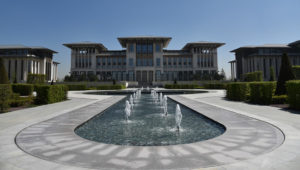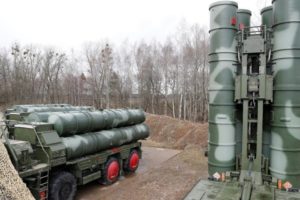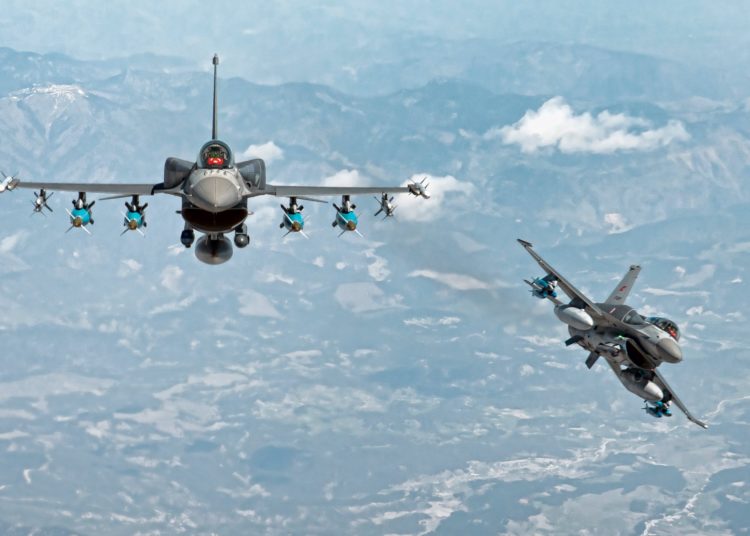Abdullah Bozkurt/Stockholm
The Turkish intelligence agency (Milli İstihbarat Teşkilatı, MIT) secretly acquired and deployed air defense systems around President Recep Tayyip Erdogan’s offices and residences in Istanbul and Ankara without coordinating with the air force, which has exclusive jurisdiction over the operation and possession of air defense systems in the country.
The revelation was initially made by MIT itself, possibly inadvertently, in a 2017 report that was obtained by Nordic Monitor. The absence of coordination with the Air Force Command was subsequently exposed during a trial in Ankara in 2018. This disclosure prompted Turkish authorities to make attempts to conceal any evidence that might shed light on what MIT described as “new weapons systems” apparently procured without consulting the armed forces.
The MIT report, which was sent to parliament on May 22, 2017 as part of an investigation into coup events in 2016 — a false flag operation allegedly orchestrated by the intelligence agency to assist President Erdogan in securing an imperial-style presidency — mysteriously disappeared. The Speaker’s Office has, thus far, not responded to opposition inquiries regarding the whereabouts of the report and its annexes.
In the report MIT acknowledged that a new combination of systems, including air defense measures, were mobilized on the night of July 15, 2016 around Erdogan’s palace in Ankara, his private residence in Istanbul’s Kısıklı neighborhood and the Ottoman-era Huber Mansion, which Erdogan now uses as his work office in Istanbul.
While attempting to defend the agency’s record, the then-head of MIT, Hakan Fidan, maintained that the deployment of these systems initially led to a reduction in flights, and eventually, a complete halt by warplanes. This was allegedly due to the detection by the air defense systems as the warplanes did not want to risk being shot down.
MIT report on air defense systems that mysteriously vanished:
He even claimed that ground-to-air missiles were, in fact, fired, indirectly confirming the origin of munitions found on the streets. According to experts, these munitions were not registered in the inventory of the Turkish Armed Forces (TSK). Public prosecutors alleged that such munitions were used by the coup plotters in the indictments filed with the courts. However, during the trials, evidence emerged suggesting that such weapons were not available in military storage facilities and most likely came from MIT’s depots.
During the coup trials, experts raised doubts about MIT’s assertion regarding the air defense systems, stating that it was simply not possible to deploy such systems in such a short amount of time. They also questioned the real motivation behind the secret setup, which appeared to have taken months to prepare and was most likely done without informing the air force.
During his testimony at the Ankara 4th High Criminal Court on February 20, 2018, Air Force Captain Oğuz Alper Emrah, a 39-year-old veteran fighter pilot and trainer, emphasized that air defense in Turkey falls under the jurisdiction of the Air Force Command. He stated that MIT is legally obligated to coordinate with and obtain permission from the military when installing such systems since they could potentially jeopardize the safety of both civilian and military aircraft in Turkish airspace.
He further emphasized that setting up such systems is a complex process that cannot be accomplished in just one day, and he called for a thorough investigation into how these systems were delivered to the intelligence agency and what authority oversaw this process.

He warned that MIT’s clandestine deployment of air defense systems could potentially lead to chaos and pose a significant risk of mistakenly shooting down Turkish military aircraft. He added, “Of course, it’s another story if that was the real intention,” suggesting that MIT may have intentionally set up these systems to destroy a few F-16s and create the impression that the false flag coup attempt was actually a genuine coup bid. He went on to say, “That’s what comes to mind; I can’t think of anything else.”
Emrah requested that the court order MIT to produce documents that reveal how such systems were acquired, who authorized their procurement and whether there was any coordination with the air force. However, the court, under the influence of the Erdogan government, declined Emrah’s petition. This decision prevented the potential disclosure of information that could have shed light on how MIT obtained the air defense systems and their role during the events of July 15.
To justify the deployment of air defense systems from a legal perspective, MIT claimed that it obtained authorization from the Prime Minister’s Office, which oversaw intelligence operations at the time, on the night of July 15. However, it did not provide an explanation regarding the authority under which it had acquired such systems before that night. This lack of explanation raised further questions about the legitimacy and basis for obtaining the systems prior to the events of July 15.
Air Force Captain Oğuz Alper Emrah’s testimony on MIT’s air defense systems during trial proceedings:
The combat pilot stood trial on false accusations of flying an F-16 to assassinate President Erdogan in the air with the intention of shooting at the presidential plane. It was later revealed that the evidence presented was fabricated and that the court did not order Turkish authorities to provide the raw flight data for the defense to review before or during the trial proceedings.
MIT’s acknowledgment of owning air defense systems that would typically fall under the control and coordination of the air force has added weight to rumors circulating in Ankara. These rumors suggest that President Erdogan may have acquired Russian S-400 long-range missiles primarily for his personal protection.
Indeed, this could potentially explain why Turkey insisted on purchasing missile systems like the Russian S-400, which are not compatible with the NATO alliance’s military systems. The lack of compatibility, coupled with concerns about the threat it poses to the integrity of NATO defense systems, has raised significant concerns within NATO and among Turkey’s allies.
Additionally, the absence of specific information from Turkish authorities regarding the location of these missiles, with only mentions of their readiness for deployment as needed, continues to fuel speculation about their intended purpose and deployment strategy.

Turkey and Russia signed a contract on April 11, 2017 for two S-400 systems worth around $2.5 billion. The first delivery of S-400 missile batteries that started on July 12, 2019 and was completed in September 2019 did not provide Turkey with any technology transfer. Russia simply sent two S-400 batteries and more than 120 long-range missiles as part of the agreement along with experts to train Turkish soldiers on how to operate them.
The insistence of Erdogan’s government on proceeding with the acquisition of the Russian arms came at a high cost for Turkey. Ankara was not only expelled from the global F-35 Joint Strike Fighter program but also incurred a series of sanctions, embargoes and restrictions on the procurement of defense items from the US and other NATO allies.
President Erdogan heavily relies on the Turkish intelligence agency to govern the country, utilizing pervasive intrusion of privacy, constant surveillance and harassment of critics and opponents, even those in exile. Additionally, he employs the intelligence agency to initiate abusive criminal proceedings against individuals perceived as threats to his two-decade-long rule.
Due to the blanket immunity granted by the Erdogan government, the Turkish intelligence agency has operated with impunity. This has included unlawful actions such as kidnapping critics, running torture centers in undisclosed locations and supporting armed jihadist groups not only in Syria but also in other countries. MIT’s activities have raised serious concerns about human rights violations and the rule of law in Turkey.












